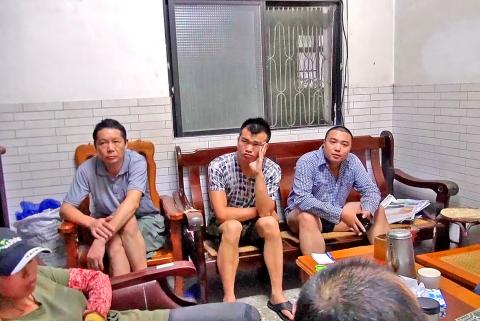Investigators in central Taiwan have uncovered an unusual case of alleged Chinese industrial espionage that targeted the agricultural sector after arresting four Chinese men working illegally on tea farms in Nantou County. The case is said to be the first one in which social media were used to gather information about the nation’s tea industry.
Officials at the Nantou County Investigation Bureau confirmed yesterday that they arrested four Chinese men, who were hired as “tea pickers” to harvest tea by hand on mountain farms around Nantou’s Jhushan Township (竹山).
The men are suspected of recording their farm work and tea processing techniques with smartphone cameras.

Photo: Copy by Chen Feng-lee, Taipei Times
The head of the group, surnamed Zhou (鄒), allegedly sent the photographs and information via social messaging app Line to a tea company in China’s Fujian Province which had hired him as a spy.
When questioned by investigators, Zhou allegedly admitted that he was hired by the Fujian tea company, which had contacts to place Chinese workers on contract jobs at Nantou’s tea farms.
“I was told to gather top-grade tea samples, learn the tea processing technique and get to know some tea farmers. This information, which they will use for their future tea processing and trading business, was recorded and sent to China using Line,” Zhou reportedly said.
Authorities said photographs were found on Zhou’s phone of tea farms in the mountainous tea-producing regions of central Taiwan, including Alishan (阿里山), Dayu Mountain (大禹嶺), Lugu (鹿谷) and Shanling Creek (杉林溪).
Officials said three of the four men came to Taiwan after applying for visas to visit relatives and were working illegally.
“It may not be so simple. Maybe they had political aims and also undertook other spying activities,” one of the investigators said.
He referred to Zhang (張), one of the four arrested, whose case hinted at a possible Chinese espionage penetration plan going back nearly two decades.
According to the investigator, Zhang, 51, divorced his Chinese wife surnamed Chen (陳) 17 years ago, which enabled her to marry an elderly retired soldier in Taiwan.
The retired soldier died 10 years ago, after which Chen inherited his monthly pension of NT$40,000 (US$1,316). Chen then returned to China to remarry Zhang, her original husband.
This enabled Zhang to come to Taiwan as her spouse and through Chen become eligible to work and live in Taiwan.
Officials suspect Zhang is the key liaison person in the operation, specializing in contacting and hiring Chinese men to work on tea farms in Taiwan.

Right-wing political scientist Laura Fernandez on Sunday won Costa Rica’s presidential election by a landslide, after promising to crack down on rising violence linked to the cocaine trade. Fernandez’s nearest rival, economist Alvaro Ramos, conceded defeat as results showed the ruling party far exceeding the threshold of 40 percent needed to avoid a runoff. With 94 percent of polling stations counted, the political heir of outgoing Costa Rican President Rodrigo Chaves had captured 48.3 percent of the vote compared with Ramos’ 33.4 percent, the Supreme Electoral Tribunal said. As soon as the first results were announced, members of Fernandez’s Sovereign People’s Party

MORE RESPONSIBILITY: Draftees would be expected to fight alongside professional soldiers, likely requiring the transformation of some training brigades into combat units The armed forces are to start incorporating new conscripts into combined arms brigades this year to enhance combat readiness, the Executive Yuan’s latest policy report said. The new policy would affect Taiwanese men entering the military for their compulsory service, which was extended to one year under reforms by then-president Tsai Ing-wen (蔡英文) in 2022. The conscripts would be trained to operate machine guns, uncrewed aerial vehicles, anti-tank guided missile launchers and Stinger air defense systems, the report said, adding that the basic training would be lengthened to eight weeks. After basic training, conscripts would be sorted into infantry battalions that would take

GROWING AMBITIONS: The scale and tempo of the operations show that the Strait has become the core theater for China to expand its security interests, the report said Chinese military aircraft incursions around Taiwan have surged nearly 15-fold over the past five years, according to a report released yesterday by the Democratic Progressive Party’s (DPP) Department of China Affairs. Sorties in the Taiwan Strait were previously irregular, totaling 380 in 2020, but have since evolved into routine operations, the report showed. “This demonstrates that the Taiwan Strait has become both the starting point and testing ground for Beijing’s expansionist ambitions,” it said. Driven by military expansionism, China is systematically pursuing actions aimed at altering the regional “status quo,” the department said, adding that Taiwan represents the most critical link in China’s

‘REALLY PROUD’: Nvidia would not be possible without Taiwan, Huang said, adding that TSMC would be increasing its capacity by 100 percent Nvidia Corp CEO Jensen Huang (黃仁勳) on Saturday praised and lightly cajoled his major Taiwanese suppliers to produce more to help power strong demand for artificial intelligence (AI), capping a visit to the country of his birth, where he has been mobbed by adoring fans at every step. Speaking at an impromptu press conference in the rain outside a Taipei restaurant, where he had hosted suppliers for a “trillion-dollar dinner,” named after the market capitalization of those firms attending, Huang said this would be another good year for business. “TSMC needs to work very hard this year because I need a lot